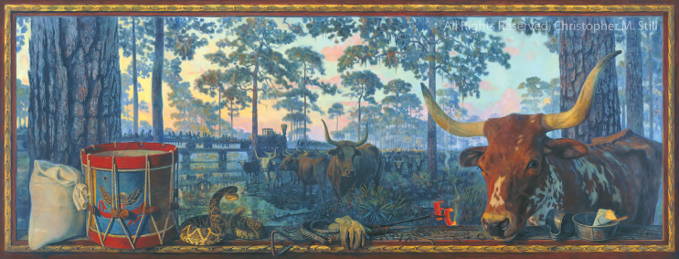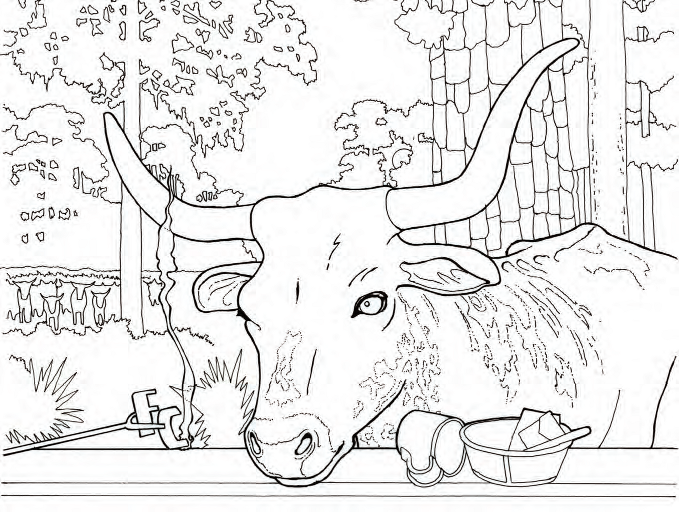Civil War and Reconstruction

Reflecting on Ocean Pond, painting by Christopher Still
Most people in southern states believed that slavery was necessary, but people in northern states did not. After Abraham Lincoln was elected President in 1860, Florida and other southern states withdrew from the United States because of this issue. Florida joined southern states in forming the Confederate States of America, also called the Confederacy.
The Civil War lasted from April 1861 to April 1865. Florida sent 15,000 men and many supplies, including salt, beef, cotton, pork, and other products, to help the Confederacy. Northern ships patrolling Florida's coast tried to block supplies from coming and going. Many white and black residents helped the northern cause in quiet ways. Several major battles took place, but Florida did not experience as much damage as its neighbors to the north.
After the Civil War, the U.S. government set up a policy called "Reconstruction" in the South. It wanted states to accept new rules, including some to improve conditions for African Americans. In the end, though, blacks had little voice in government.

Did cows always live in Florida? Find the branding iron in the painting. What brand do you think this is? Go to www.christopherstill.com/fl-house-of-reps to learn about Florida cattle.
Web Quest
What do you know about Florida's role in the Civil War?
During the Civil War, Floridians faced a shortage of many items, such as coffee, sugar, salt, and even shoes. People created alternative ways to produce these items. For example, people boiled sea water to produce salt so that they could preserve their meat.
Historians study documents such as letters, diaries, memoirs, and photographs to interpret how historical events impacted people's daily lives.
Your task for this Web Quest is to read an excerpt from a memoir and find images that relate to it to understand how the Civil War impacted people's lives in Florida.
Directions
Read the memoir excerpt on page 21 or on the Florida Memory web site at (www.floridamemory.com/items/show/69683). Search "salt factory" and "salt marsh."
Questions to Answer
How did Joshua's family feel about the war?
How old was he when he enrolled in the First Florida Reserves?
What was the inventive way to make salt?
What kind of meat did they preserve?
How does Joshua describe its appearance?
Scroll through the search results of "salt marsh." Where are some salt marshes located?
What is the legend associated with the St. Mark's Lighthouse?
Excerpt from Joshua Hoyet Frier's Civil War Memoir
Who was Joshua Hoyet Frier?
Joshua Hoyet Frier was born in Lowndes County, Georgia. He lived with his family near the Florida border. Frier's father and brothers were opposed to secession. One brother eventually enlisted in the Eighth Florida Infantry Regiment and was killed by Confederate authorities after he deserted. On his seventeenth birthday, May 20, 1864, Joshua Frier enrolled in a Florida militia company that eventually became the First Florida Reserves, Company B. The unit remained in north Florida throughout its service. This selection is from his work, Reminiscences of the War Between the States by a Boy in the Far South at Home and in the Rank of the Confederate Militia .
But the most serious ill convenience however, that was felt was salt, having by our civilization been accustomed to a free and all most unlimited supply; to be suddenly cut off without a grain, was a situation that can be imagined, but not realized only by experience. It is true the South had a long coast line where unlimited quantities might have been manufactured (and it was done later on) we had no arrangements of making it, and iron mind you at this time was as scarce as hens teeth. There was no persons among us that understood the manufacture of it, and last but not least, was a dread of Yankee gun boats for while according to reports, our army had uniformly been successful on land; we had invariable been worsted where they could get at us with those invulnerable monsters, and the idea of setting up an industry right under the nose of the United States Navy was something we did not do until forced to do so. But the salt was gone and it meant we had to either have some, or quit eating, the one looked like an impossibility, while the other was a dreadful alternative. About this time some inventive person discovered that by taking up the dirt out of the meat houses, and leaching it a fair article of salt could be made: this he published for the good of suffering humanity. Next day all hands went to work, erecting hoppers to leach the earth in, and improvising furnaces for the evaporation of the water after it had leached out the precious property, late in the evening we took a small run off, the product of which was about one gallon of I hardly know what to call it, it looked much more like mud than salt; but it was salty any how. The water leached abundance of other matter out of the meat house soil besides salt, but for the sake of what little salt there was in it we manufactured several bushels of it; and that winter 1862–63 we saved our pork with it. A piece of pork liberally smeared with it had the appearance of being wallowed in the mud. But even a new danger confronted us; the supply of dirt was limited, in fact it was all utilized the first season. So at the dawn of 1863 the prospect of a Salt famine added gravity to the already grave situation.
State Archives of Florida, Florida Memory, www.floridamemory.com/items/show/69683


